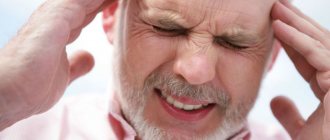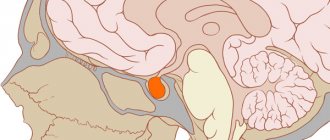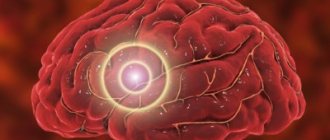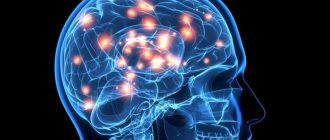Depression is a mental disorder characterized by low mood and loss of the ability to experience pleasure. One way or another, throughout life, every person faces depressive conditions. You need to be able to distinguish pathology from sadness, lack of mood and overwork. A psychologist can answer the question of how to know if you are depressed. Severe disorder requires psychotherapeutic and drug treatment.
Diagnosis of depression
Diagnosing depression is a complex process because... disturbances occur on the part of all internal systems, which were caused by changes in the mental state and deviations in the functioning of the central nervous system.
Depression manifests itself not only in despondency and constant crying or irritation. Additionally, changes in the behavioral pattern are observed, various symptoms arise, indicating deviations in the functioning of any internal organs. When a person complains of apathy, loss of interest in life and at the same time itching of the skin and dysfunction of the reproductive system, it is difficult to make an accurate diagnosis.
Diagnosis of depression is the responsibility of a psychotherapist. But before a specialist makes the right conclusion, you will have to undergo a comprehensive examination, which includes:
- Anamnesis collection. The goal is to determine the causes of depression, analyze the patient’s complaints and symptoms in order to determine the severity of the clinical case. If the doctor has extensive experience and high qualifications, then an initial examination of the patient and a conversation with him will be enough to identify the presence of depression.
- Pathopsychological diagnosis. The procedure can be carried out by a psychologist. Special techniques make it possible to differentiate a depressive state from other diseases that have a similar clinical picture, and to evaluate the effectiveness of previously prescribed therapy.
- Consultation with a therapist and neurologist. The need for the services of these specialists arises when, in addition to a disturbance in the psycho-emotional state, a person complains of such accompanying symptoms as pain in the heart, frequent attacks of dizziness, painful and uncomfortable sensations in other parts of the body.
- Conducting laboratory tests (blood and urine) and using instrumental examination methods such as ultrasound, MRI, CT, ECG. They are prescribed if the doctor suspects the presence of concomitant diseases.
Diagnosis of depressive conditions also includes a neurotest. Its results allow us to identify mental disorders that could provoke depression or become a consequence of it, for example, schizophrenia or schizotypal disorder.
Duration of treatment for depression
The above method of identifying a mental disorder sounds complicated and obviously takes a lot of time. Therefore, scientists have long been trying to find a faster and equally accurate method. Scientists from Germany and Belgium have long realized that their heartbeat can hint at the presence of depression in a person. But finding a connection between heart rate and depression was difficult for at least two reasons. Firstly, the heart rate depends on many factors and to make an accurate diagnosis it is necessary to monitor the rhythm for at least 24 hours. Secondly, to develop a new diagnostic method, it is necessary to identify the difference in the heart rate of the same person before and after treatment. But treatment for depression can last several months or even years.
Even excessive use of a smartphone can lead to depression
The first problem was easy to solve, because almost all modern fitness bracelets can monitor a person’s heartbeat all day long. But scientists have only recently learned how to quickly relieve people of depression symptoms for a short period of time. In 2021, the US approved the use of an antidepressant called ketamine, which is banned in Russia . It quickly eliminates a person's symptoms of depression, but its effect does not last long.
Ketamine is banned in Russia
What can depression be confused with?
If your mood is often bad, irritability and aggression appear, and you don’t want to do anything, these signs do not always indicate that a depressive disorder is developing. Perhaps the change in psycho-emotional background and deterioration in general condition is associated with vitamin deficiency or the onset of autumn, when with rainy weather and insufficient sunny days, many people experience autumn spleen or blues.
The appearance of a depressed state and a number of other psycho-emotional changes may indicate not only depression, but also a number of other diseases, therefore the diagnosis of a depressive disorder includes a mandatory differential examination. It is necessary to differentiate depression from the following diseases:
- hypothyroidism;
- diabetes mellitus;
- chronic fatigue syndrome;
- bipolar disorder.
Hypothyroidism
Hypothyroidism is a deviation in the condition and functioning of the endocrine system, resulting from insufficient production of certain hormones by the thyroid gland. It's easy to mistake common hypothyroidism symptoms for depression, such as:
- depression and apathy;
- increased fatigue, constant feeling of drowsiness;
- dullness of concentration;
- frequent mood swings for the worse;
- causeless irritability.
Diabetes
In type 2 diabetes mellitus, the following clinical picture is observed:
- sudden loss of body weight for no apparent reason;
- constant feeling of irritation;
- outbursts of aggression;
- fatigue, drowsiness;
- reluctance to do anything, complete apathy.
Chronic fatigue syndrome
Chronic fatigue syndrome is the scourge of our time. This is not just laziness and a person’s constant desire to sleep, but an official diagnosis that requires treatment, because... may lead to the development of depression.
Despite a number of identical symptoms, chronic fatigue syndrome differs from depressive disorder in that a person retains interest in his favorite activity, hobby, but lacks the physical and emotional strength to fully engage in what brings pleasure.
Bipolar disorder
Bipolar disorder is a mental disorder that can be considered a type of depression. The clinical picture is as follows:
- lack of appetite, a person may not eat food for several days, but he will not be tormented by hunger, because... he simply won't feel it;
- dramatic mood changes;
- irritability and nervousness, hysteria;
- apathy is suddenly replaced by a surge of strength, self-confidence, and a desire to do something;
- depression.
Bipolar disorder is a complex mental illness that requires long-term treatment and a high risk of future relapse.
Causes of depression
Every person can encounter this pathology, regardless of age, health, or social status. However, women are more susceptible to depression than men. It is believed that smart people who spend a lot of time thinking are more susceptible to the disorder. But there are no exact statistics in this area.
Such outstanding personalities as Abraham Lincoln, Mark Twain, Sigmund Freud, and Franz Kafka suffered from depression. Many modern celebrity personalities have also encountered the disorder. This only confirms that money, fame, recognition do not protect a person from mental problems, because the whole world is inside him.
How to determine that a person has depression and understand the reasons for its occurrence?
Experts identify several main factors in the development of this disorder.
- Biological factor . Here, the triggers can be organic diseases, metabolic disorders, genetic predisposition, hormonal imbalances (especially in women after childbirth and menopause).
- Psychological factor. The cause of the development of depression can be various psychological traumas, such as the loss of loved ones, experiencing disasters or difficult events, divorce, loss of property, business or work, problems in the family and personal life, lack of self-realization, and the like.
- Social factor . It is found mainly in countries and cultures with very rigid social boundaries that do not allow people to step over them by expressing themselves or accepting different views. For example, there are countries where young people are married by their parents, regardless of their feelings and desires. Refusal of traditions entails renunciation of the family and a shameful stigma. It is not surprising that victims of social stereotypes develop mental disorders.
Irritability and fatigue
Increased fatigue is one of the first signs of the development of this condition. One day a person notices that he can’t get out of bed in the morning, and it’s not a matter of laziness or the desire to soak up more under the covers. The individual physically cannot force himself to get up. At the thought that he will need to move, do something, talk to someone, he gives up.
Against the background of pathological fatigue, irritation occurs. A simple phrase with a good morning wish from a loved one will cause anger and irritation inside. Familiar, everyday things that were not paid attention to before, such as waiting for an elevator, a traffic jam, now cause even more irritation.
Who treats clinical depression?
Psychiatrist or psychotherapist. For endogenous depression, drug treatment is necessary.
In our country, only a psychiatrist or psychotherapist—people with medical education—has the right to prescribe medications. Psychologist. In addition to medical attention, patients most often require the help of a psychologist or clinical psychologist - specialists who can provide psychotherapeutic support. Without this, it is difficult to recover: the patient is left with feelings and internal conflict, which pills do not help to cope with.
The patient himself. Often, depressed patients withdraw into themselves, put on pajamas and do not get out of bed. This is a bad tactic. For treatment to help, you will have to at least take medications and visit a psychologist.
Maria Manukhina, psychologist
Lack of motivation and low self-esteem
How do you know if you are depressed? This is a question that is extremely difficult to deal with on your own, just as it is difficult to analyze your behavior. But the most striking manifestation of depression is the sudden appearance of complexes. Waking up one morning, a person begins to think that he is not like everyone else or is unable to continue to fulfill his professional and other responsibilities.
Difficult experiences are aggravated if problems at work or in the family are added to the emerging inferiority complex. The person feels incapable of anything. Some people, having suffered a small setback today, begin to analyze it, delve into themselves, look back on the years they have lived and find many mistakes in their behavior, remembering life plans that they could not realize. Against the backdrop of such thoughts, depression begins to develop rapidly.
Along with low self-esteem, motivation to do anything is lost.
Even simple household things, such as cooking dinner, are perceived as a difficult task. The feeling and understanding of why this is being done disappears. At such moments, a person begins to think that all life is in vain, that there is no meaning in it, there is no idea in the actions and deeds performed, and this means that there is no goal to move forward.
How do you know if you have depression that requires seeking help?
It is recommended to overcome mental disorders together with an experienced psychologist. Be sure to contact a specialist if more than two symptoms characteristic of a depressive state bother you for more than 2 weeks. Severe and reactive disease requires a systematic approach to treatment. A person can only fight dysthymia on his own. An experienced specialist knows how to understand that a person is depressed and what needs to be done to quickly restore normal mood.
Depression is a dangerous pathology from which no one is immune. Knowing about the symptoms of depressive disorder, a person can begin to deal with the problem in time. Taking mental health seriously reduces the likelihood of developing complications from the disease.
Isolation, passivity and loss of interest in life
Depression can also be determined by close people, especially if the person used to be the life of the party, had a bright temperament, had many friends, a favorite hobby and preferred to have fun. People with depression suddenly break off all contacts. They become unsociable. They cease to be interested in their previous circle of contacts, and indeed in communication itself as such. I want to be at home, completely isolated from the outside world and other people.
The desire to do what you love or hobby disappears, because... there is no motivation, the meaning is lost.
If a person was previously fond of a healthy lifestyle, he suddenly gives up regular exercise, stops watching his diet, at such moments he is overcome by thoughts that there is no point in devoting time to something that will not have any meaning after death.
Sleep disorders
There is one of the most reliable signs of the onset of the development of a mental disorder - sleep disturbance. It's not just about insomnia. The inability to fall asleep for a long time is due to the fact that sad, pessimistic thoughts constantly flash through your head. In part, a person understands that his behavior has changed, that he was wrong in relation to close people, and a feeling of guilt arises.
This creates a whirlpool of thoughts, because of which a person cannot sleep and wakes up several times during the night. There is no opportunity to relax physically and mentally.
Symptoms of depression
Primary symptoms:
- decreased mood lasting at least 2 weeks;
- limiting the range of interests;
- excessive fatigue;
- decreased motor activity.
Minor symptoms:
- inability to concentrate;
- decreased self-esteem;
- diffidence;
- guilt;
- pessimism;
- suicidal thoughts;
- insomnia;
- appetite disorders.
Symptoms from internal organs:
- tachycardia;
- mydriasis;
- constipation
Dark thoughts and feelings
Psychology indicates that the human psyche is structured in such a way that one violation of the psycho-emotional state entails other complications.
A person ceases to see the meaning even in what he lives. These dark thoughts are aggravated by a feeling of guilt for one’s uselessness, helplessness, and ideas appear that close people will be better off without him.
There is an interest in the afterlife. Thoughts come that “there” it will be better, there will be no pain and melancholy, routine, meaningless responsibilities. Statistics show that prolonged depression, if left untreated, leads to suicide in 80% of cases.
Women may experience dark thoughts and suicidal tendencies after childbirth. Postpartum depression is an extremely dangerous condition in which a woman can commit suicide for no apparent reason to others. Gloomy and suicidal thoughts are associated with fears that a woman will not cope with the role of a mother, that she has in vain let another soul into this mortal, cruel world. Postpartum depression is aggravated by a total restructuring of the hormonal system.
Having discovered the slightest changes in his wife’s behavior after the birth of a child, a man should seek medical help as soon as possible in order to diagnose a depressive state. Under the influence of postpartum depression, a woman can harm not only herself, but also her newborn baby.
Types of depressive disorder
The disease is divided into several types. Classification is based on the severity and number of manifestations. The following types of disease are distinguished:
- Major depressive disorder. This condition has a large number of manifestations. There is loss of appetite, insomnia or drowsiness, fatigue and depression. This disorder lasts for at least 2 weeks.
- Minor depression (dysthymia). Dysthymia is characterized by a long course, but a small number of manifestations. The diagnosis of dysthymia is made if pessimism and lack of motivation have plagued a person for at least 2 years.
- Bipolar manic-depressive disorder. This condition is characterized by manic and depressive phases. During the manic phase, a person feels cheerfulness, motor excitement and a surge of strength. Excitement leads to overestimation of one's own strength, anger and inability to concentrate. The depressive phase is characterized by depression, melancholy and suicidal thoughts. The change from one phase to another occurs for no apparent reason. Due to bipolar disorder, the comfort of life is significantly impaired.
- Reactive depression. This type of pathology is characterized by immediate development. As a rule, the disease makes itself felt when faced with any tragedy.
Detecting the problem and carrying out the correct treatment is possible only after diagnostics.
Change your appearance
If depression causes complete apathy and a radical change in the usual way of life, lack of motivation for any task and isolation, this can seriously affect a person’s appearance. Sloppiness appears. And it’s not that people are too lazy to put their clothes in order; they simply don’t pay attention to it.
People do not see the need to take care of themselves: brush their teeth, wash their hair, and carry out other hygiene procedures. An unpleasant odor emanates from the body; people around him begin to avoid such a person. Because of this, the condition worsens even more, but the patient cannot explain to himself why everyone is avoiding him, which makes him even more convinced of his incompetence.
Unpleasant sensations in the body
Depression is not only changes in psycho-emotional state and behavior patterns. In addition to depression, bad mood and apathy, there are other physical signs that make diagnosing the disease more difficult.
Associated conditions with depression:
- Vegetative-vascular disorders: rapid heartbeat, frequent pressure surges, a feeling of internal hot flashes, chills in the extremities. Symptoms may also be the opposite: internal chills, slow heartbeat. Red spots appear on the skin.
- Heartache. Depression can manifest itself in a feeling of compression in the sternum, dull or sharp pain in the heart, and shortness of breath. Heart palpitations often occur. The development of this clinical picture in depression may be associated with panic attacks.
- Manifestations on the skin. Depressive conditions are often accompanied by psychosomatics, which makes it quite difficult to make a correct diagnosis, especially in cases where mental disorders occur in a latent form. There is no tearfulness or apathy, but eczema may appear. This skin disease often occurs against the background of depression. Its appearance is explained by psychological trauma and anxiety. Eczema can occur against a background of constant irritability and depression. In addition to eczema, painful cracks in the skin may also form.
How to recognize depression
In psychology, depression is defined as a condition characterized by a negative emotional background. It can be recognized when there is a change in motivation and passive behavior.
Depression can be prolonged, which makes the situation worse. Getting out of this state is not easy, especially without the help of a specialist. Therefore, it is important to be aware of the symptoms of the disease in order to prevent its development.
Note! It is important to distinguish a bad mood from a dangerous illness in time. You need to understand how to recognize depression in the early stages in order to get rid of it painlessly.
Depression is quite insidious and can be hidden behind somatic disorders, which makes diagnosis difficult. For example, it can cause headaches. As a result, after a conversation with the patient, doctors make a diagnosis of migraine and prescribe painkillers. Naturally, medications do not help get rid of unpleasant sensations. Or depression leads to pain, heaviness in the stomach, and nausea. Moreover, their nature can be different, up to the suspicion of appendicitis. But doctors again do not find any abnormalities in this area.
Lack of attention to the problem, the lack of competent specialists who understand how to define depression, leads to an increase in cases of the disorder and the development of advanced stages. All this poisons the life of not only the patient himself, but also his loved ones.
Sexual dysfunction
Dysfunction of the reproductive system occurs in both men and women, but it manifests itself in different ways. A common sign of sexual dysfunction with depression in women and men is a decrease in libido, which occurs gradually, and after some time there is a complete absence of sexual desire.
In men
Due to lack of interest in a partner and sex, constant fatigue and apathy, men have problems with erection.
Among women
Women experience gynecological problems. Most women with depression first see a gynecologist with complaints such as pain in the lower abdomen, increased symptoms of premenstrual syndrome, and irregular menstrual cycles.
Appetite and digestion
With the development of depression, appetite may change: either the person begins to experience a constant feeling of hunger, or it is completely absent.
In the first case, excessive consumption of large amounts of food in a short period of time leads to rapid weight gain. An overweight person experiences even greater complexes about his appearance and withdraws into himself. The inability to control your appetite causes a feeling of shame and guilt, in this case there is a high risk of developing bulimia - an eating disorder that requires separate treatment.
In the second case, there is a risk of developing anorexia. A depressed person may simply not feel physically hungry. The absence of any food leads to rapid weight loss. In a month, body weight can decrease by 10-15 kg or more.
Against the background of depression, disorders of the digestive system often develop. They can be caused by an eating disorder: uncontrolled appetite or complete refusal to eat.
Painful sensations appear in the abdomen, taste perception changes. Nausea often occurs in the morning, which can result in vomiting. A bitter taste and a metallic taste appear in the mouth.
Indigestion may be accompanied by constant constipation or, conversely, diarrhea. If these symptoms are present, a person will never think that he has depression and turns to a gastroenterologist, believing that he has gastritis, peptic ulcer disease or colitis.
What doesn't help with depression
Time. If depression is left untreated, it can last for years. Some people are lucky and the depression goes away on its own. But it’s better not to count on this. It is worth starting treatment as early as possible.
Self-isolation. A depressed person may feel like they are a burden to others. In this case, you just need to remind yourself that depression is a disease, and treatment without the help of a specialist and the support of family and friends does not work well.
Alcohol. A study has shown that a glass of wine a day reduces the risk of depression. But if you drink more than a glass, the risk of depression, on the contrary, increases. So you shouldn't count on wine.
Vacation. Sometimes it seems that all the problems are just from fatigue, and a couple of weeks of rest will help you recover. Unfortunately, this won't work for real depression. It is useful to take a vacation to start working with a psychologist - but you should not expect that you can “fly away from depression.”
Good and bad days
Constantly changing mood is another manifestation of depression. But this symptom is not typical, and if present, the mental state may be confused with bipolar disorder. The clinical picture is manifested by the presence of “good” and “bad” days for the patient, which he creates for himself.
For several days there may be complete despondency and apathy, but one day, waking up in the morning, there is a feeling that the world is wonderful, everything is fine, you want to create and work. The mood is normalized, irritability and aggression disappear. Personality and behavior change dramatically.
On “good” days, a person becomes overly happy, he is bursting with ideas, and is in such a positive mood that it is more pathological than normal.
But after such “good” days, sudden despondency and indifference to life rolls in with renewed vigor, and the clinical picture of mental deviation is further aggravated and intensified. After such emotional outbursts, a return to a state of indifference provokes many people to commit suicide.
What is depression?
Women's depression is not just a bad mood. Now it is fashionable to use this word to describe any attacks of blues and apathy. In fact, depression is a disease with varying degrees of severity and its own symptoms. During this condition, a person cannot live and work normally, study and perform his daily duties. The feeling of sadness and apathy is pronounced and lasts for a long time, at least 2 weeks. There are cases when depression accompanies a person for six months or more.
Prolonged blues never arise out of nowhere. The disease is preceded by a crisis, some important events in life. The death of a loved one, divorce, dismissal from work, expulsion from college, breaking of socially significant ties - the reason for the disorder always has a personal connotation.
There are people with a depressive personality in whom severe stressful situations trigger the disease mechanism. If you do not solve the problem yourself or with the help of specialists, depression can drag on and cause serious harm to a person’s psyche and his socialization. Those close to a woman prone to blues need to be especially careful and not miss the alarming symptoms.
When should you see a doctor?
Rarely will any patient be able to understand for himself that he is developing depression. But there are a number of signs, the presence of which requires immediate consultation with a doctor to conduct a thorough examination:
- frequent mood swings;
- sudden apathy and loss of interest in what you love;
- decreased appetite;
- unreasonable fluctuations in weight up or down;
- the occurrence of painful sensations in the body, frequent headaches, abdominal discomfort;
- decreased or complete absence of sexual desire;
- sudden craving for alcohol or cigarettes, if the person has never smoked and practically did not drink alcohol;
- the desire not to communicate with people, to completely isolate from them.
If you don’t have the strength to get up in the morning and start a new day, your usual activities and hobbies have become uninteresting, you have no desire to communicate with friends and loved ones, you should immediately consult a doctor. A regular therapist is able to prescribe primary treatment or refer the patient to a specialized specialist: a psychotherapist or psychiatrist.
Features of therapy
To treat severe forms of depression, you should seek help from a specialist - a psychotherapist who will identify the cause of this condition and develop methods to eliminate the problem. Typically, antidepressants and sedatives are used for this.
Mild forms of depression respond well to treatment with basic mutual understanding on the part of loved ones and the introduction of physical activity into the usual daily routine. Aromatherapy, music therapy, acupuncture, and a change of familiar environment are also indicated. It is important for a person who suffers from depression to diversify their leisure time with travel.
The main thing in the treatment of depression is caring for the patient and his loved ones and their caring attitude towards him. This can manifest itself in different ways, the main thing is that the person feels needed and loved.
It is worth noting that depression never goes away on its own.
And you need to take this seriously so as not to start a problem. If you have any of the manifestations of depression, you should definitely consult a psychologist before taking any measures.











